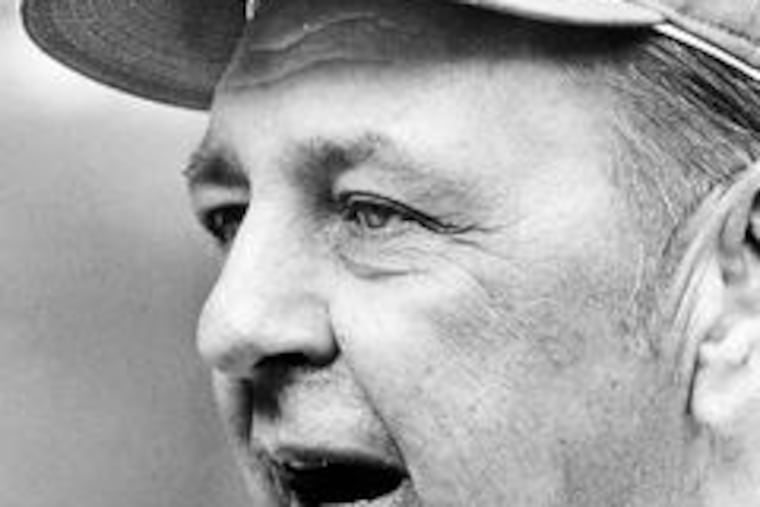
CLEARWATER, Fla. - Some days at the ballpark are better than others and Sunday was one of them.
Charlie Manuel gave me some time after batting practice. We stood on the emerald green grass - more Augusta National fairway than ballyard carpet - and the Phillies manager talked about how it would all start to come together for his lagging team once the roster cuts gave him something resembling a major league roster. Manuel could have said, "Oh, by the way, Chase Utley broke his leg this morning" and it would have sounded upbeat under a midday sun dominating a cloudless, cobalt blue sky.
Charlie plodded through the lack of offense, the nagging injuries in his country drawl, an easy, backwoods patois that plays so poorly in places like Philly, where, ironically, mangling the King's English has been a prideful art form since the first "Yo" was uttered by somebody too lazy or unlettered to say, "May I have your attention, please?"
Imagine turbo malaprop Casey Stengel doing a daily pregame show with Mel Allen's hand-mike stuck in his face, then face the print, radio and TV media in a mass, postgame clusterbleep with every malaprop, slurred word or incorrect usage beamed to hundreds of thousands.
I thought about a good man named Danny Ozark whose Phillies teams averaged 88 victories over six full seasons and 91.6 for his final 5 full years. His classic malaprops were almost always spoken to small groups of print journalists. Imagine if the Wizard of Oze had said, "Mike Anderson's limitations are limitless" with a half-dozen cameras rolling tape, the TV crews flanked with radio-heads and ball writers. What if he had been facing a multimedia jury after the Pirates eliminated the 1975 Phillies from the pennant race and said, "We're still alive; we can still tie them." The only ones in his office were the late Frank Dolson and myself. Danny's math never became a cause celebre.
Manuel has grown on me the same way Ozark did. In 1973, when GM Paul Owens had to defuse an active player mutiny led by Steve Carlton, I thought The Wizard was a solid teacher who was overmatched when it came to running a major league clubhouse. With the Dodgers he was a solid third-base coach who ran spring training and orchestrated "Baseball The Dodger Way," the organizational manifesto of Al Campanis.
In 1974, Ozark withstood an early-season Owens fact-finding trip to New York to determine if he still controlled the clubhouse. He did, but by a slim margin. A third of the players wanted him gone, a third liked his easy demeanor and fairness and a third had no opinion. Over time, the no-opinion guys gradually drifted into his corner and saved him.
I was rolling those thoughts through the spare rooms in my head when I heard a familiar voice and looked up from a nutritious meal of tossed salad and spring water. There was The Wizard himself, beaming at the side of Phils PR vice president Larry Shenk. A cancer survivor at age 83, Danny was in St. Petersburg to manage in a Legends charity game and drove up U.S. 19 to visit old friends. Bobby Wine and Lee Elia were in the lineup of present and former Phillies people who wanted to say hello. Later, Danny joined Bill and Nancy Giles in the stands, then chatted amiably with Dallas Green, who replaced him on Labor Day of a catastrophic 1979 season.
We sat in the sun for five innings, watching the Phillies rake the vaunted Twins pitching.
I asked Danny if he remembered saying during his first spring training that he would trade Mike Schmidt "for a wagon-load of pumpkins?" "Were we getting that much?" he deadpanned.
Ozark ranks Schmidt at the top of a long list of players he mentored and instructed during his long career.
"Schmitty kept wanting to be the kind of hitter he wasn't," Danny said. "One day, he came up to me and said, 'How come you never give me the hit-and-run [sign]?' I said, 'Mike, first of all, you swing through too many pitches. Second, they don't pay the big money to guys who can execute the hit-and-run.' In BP, he always practiced hitting the ball to rightfield, being a more complete hitter. I told him to take less pitches. The kind of hitter he was, he needed all three strikes and he needed to forget walks and try to hit every ball hard because when he did hit it, good things usually happened. He just killed mediocre pitching. But the Tom Seavers and other top pitchers routinely buried him. It took him a few years, but he finally realized he was a premier home run and RBI man, not a .300 hitter."
Larry Bowa?
"Bo kept telling me he wanted to lead off. I told him, walk 100 times and you can lead off. He just never took enough pitches to hit first. But he was one hell of a competitor."
I asked Danny about the game in St. Louis where he came out to take the baseball from Carlton. Lefty glared holes in the skipper, then slam-dunked the ball into his enormous right hand. Were there repercussions?
"You guys were never told about them," Ozark said. "I called a clubhouse meeting the next day and I told Steve in front of the team that if he ever showed me up like that again, I would kick his [butt] and said, 'If you don't like how I'm talking to you, I'm standing right here.' "
And The Wizard of Oze is still standing . . . *
Send e-mail to bill1chair@aol.com.
For recent columns, go to http://go.philly.com/conlin.